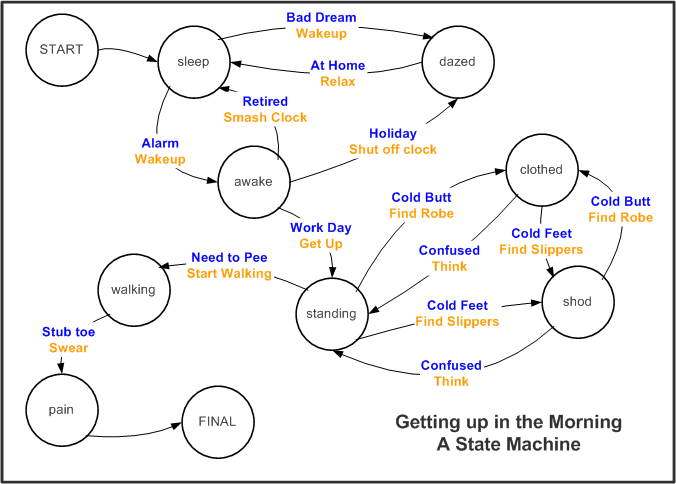State Machine Controller

next
The
lowest level of RoboCar control uses a State Machine to sequence and
respond to events. In this case it is a Mealy machine (there is another
slightly different variety called a Moore machine, but the Computational Mechanics paradigm we
are working in uses Mealy's).
A State Machine has two basic elements and the diagrams look a little like, and have some real similarities to, network diagrams. The elements are:
There are two possible Inputs indicated: Bad Dream and Alarm.
Lets say the Alarm goes off, so we execute the Wakeup Action and transition to the awake State.
In the awake state there are three possible inputs and they are all internal realizations. Assume we know that it's a Work Day, so we decide to Get Up.
After completing the Get Up Action we are in the standing State. And the day proceeds from there (notice that the only FINAL State is pain...)
In the cases where there are multiple Input/Action transitions we can attach probabilities to each possibility. For instance in the awake State we can realize three possible Inputs: Work Day, Holiday, or Retired. We can estimate probabilities for each something like:
A State Machine has two basic elements and the diagrams look a little like, and have some real similarities to, network diagrams. The elements are:
- States -- the condition of the system at the time, represented as circles;
- Transitions -- a change from one State to another, shown as directional lines.
- Input -- something that happens to the system either internal or
external,
here shown in BLUE; - Action -- response to the input, usually
a physical behavior,
here shown in ORANGE; - Probability -- the likelihood that this
transition will happen,
not shown on diagram.
- We are in some State;
- We get an Input;
- We select and execute some Action in response to the Input;
- We transition to another (or possibly the same) State;
- Repeat from 2.
There are two possible Inputs indicated: Bad Dream and Alarm.
Lets say the Alarm goes off, so we execute the Wakeup Action and transition to the awake State.
In the awake state there are three possible inputs and they are all internal realizations. Assume we know that it's a Work Day, so we decide to Get Up.
After completing the Get Up Action we are in the standing State. And the day proceeds from there (notice that the only FINAL State is pain...)
In the cases where there are multiple Input/Action transitions we can attach probabilities to each possibility. For instance in the awake State we can realize three possible Inputs: Work Day, Holiday, or Retired. We can estimate probabilities for each something like:
69.9999% -- Work
Day;
20% -- Holiday;
.0001% -- Retired;
This makes it a Stochastic State
Machine which is a fancy name for probabilistic. This is the
sort of machine that the RoboCars use for their controller.20% -- Holiday;
.0001% -- Retired;